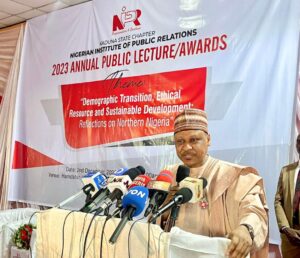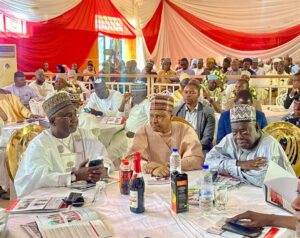
Protocol.
1. I am highly delighted to be among colleagues today in my capacity as the Minister of Information and National Orientation. To me, this is a homecoming, having served as the Chairman of the Kaduna State Chapter of the Nigerian Institute of Public Relations (NIPR) from 2004 to 2008.
2. My first assignment as Minister was to receive the outgoing Council of the NIPR, under the leadership of the immediate past President of the NIPR, Alhaji Mukhtar Sirajo, on a courtesy visit to my office. I subsequently declared open the 2023 Annual General Meeting, where our current president, Dr. Ike Neliaku, was elected, along with the new Council members. There is no doubt that NIPR is very dear to my heart, and I must once again express my pleasure at being here with you today.
3. I have spent some time reflecting on the theme of this year’s Public Lecture: “Demographic Transition, Ethical Resources, and Sustainable Development: Reflection on Northern Nigeria”, and I have to say that you have selected a most fitting Guest Speaker, as well as panelists, who will do justice to it.
4. I have been given the privilege to contribute remarks to today’s conversation, and I hope that I can add a few things to the conversation, that the panel will find worthy of consideration.
5. The concept of Demographic Transition is a very important one for Nigeria, considering the place we occupy as Africa’s most populous country, and one of the fastest growing countries in the world. Indeed, by the year 2050, Nigeria will be the third most populous country in the world, after India and China, and ahead of the United States.
6. On top of this, we are a very young population, with a median age of 19. What this means is that half of the population of our country is younger than 20. You can imagine what the implications of this are for our present and our future: education, healthcare, jobs, security, economic potential.
7. We owe these teeming young people a great deal, starting with ensuring that they are educated for the world of the 21st century. Indeed, with our population, we are at a crossroads. In one direction lies demographic dividend, and in the other direction lies demographic disaster.
8. The choice is now up to us, as leaders, as elites, regarding what direction Nigeria will proceed in. Today’s young people, if properly educated and catered for, will be tomorrow’s engaged and productive labour force.
9. Demographics are not only about age; gender is another important element. Nigeria’s population is roughly split evenly between men and women. A society with fifty percent women should strive to reflect this in its positions of influence and leadership. That is another challenge facing Nigeria today.
10. With this background of age and gender in mind, we must therefore ask ourselves: do we fully understand the demands placed upon us by our evolving demographics, and are we aligning our policies and programmes align with the specific and equally evolving needs of our diverse population?
11. At this juncture, let me remind us that one of the pillars of President Bola Ahmed Tinubu’s Eight-Point Agenda is “Inclusivity”, which means inclusive policies and programmes for all segments of the population, especially youth and women.

12. You can see manifestations of this even in the array of appointments made by the President so far, and the prominence given to young people and to women. This is not to say we have done enough, and can therefore rest on our oars. No. We can still do better, and I can assure you that President Tinubu will continue to push the envelope in this regard.
13. In addition to appointments and representation, the Tinubu Administration has very importantly been rolling out policies targeted at creating the enabling environment for Nigerians to thrive, across all demographic categories.
14. We must acknowledge that the government came into office at a very challenging time in our nation’s history. But President Tinubu has confronted all the inherited challenges head on. Nigerians have as President a transformational leader with a solid track record in the private sector and at the level of subnational government. A man who will not be fazed by challenges and obstacles, who has regularly said he does not need pity or sympathy; because he asked for and passionately sought the job.
15. Just this week, he presented the 2024 Appropriation Bill of N27.5 trillion to the National Assembly, the first full-year Budget of his Administration. The Budget as presented signifies a pivotal step towards the realisation of his Renewed Hope Agenda, by aligning fiscal strategies and priorities with broader national development objectives.
16. In addition to its focus on development priorities, the budget demonstrates a commitment to fiscal responsibility. President Tinubu’s administration recognises the importance of prudent financial management as the foundation for long-term economic stability. As the 2024 appropriation bill moves through the legislative process, we are very optimistic that its passage will mark the beginning of a transformative era, bringing tangible improvements to the lives of Nigerians.
17. Before this week’s Budget Presentation, President Tinubu had assented to an equally important Supplementary Budget, signed a number of landmark Bills and Executive Orders into law, and inaugurated special presidential initiatives on fiscal policy reform, Compressed Natural Gas (CNG), Food Security, MSME Support, and other critical areas of the economy. The goal has been to deliver relief to the Nigerian people, and lay the groundwork for true and lasting prosperity.
Distinguished guests, ladies and gentlemen,
18. The theme of today’s Public Lecture highlights a specific focus on Northern Nigeria. I am reminded that about two months ago, I was privileged to attend a Conference on Education in Northern Nigeria, organized by the Sir Ahmadu Bello Memorial Foundation. In my remarks on that occasion, I reflected on the fact that, almost 60 years after the tragic death of the Sardauna of Sokoto, Sir Ahmadu Bello, his achievements and legacies continue to loom very large, and are still the standards by which we measure great leadership here in Northern Nigeria.
19. I have always asked myself why this is so, why are we still trying to aspire to the kind of great leadership he epitomized, instead of taking it as the starting point and setting new records of greatness. This is a question we all have to seriously consider and find answers to. I will leave this difficult challenge to the Guest Speaker and the panel.
20. As I close, let me address a most germane issue that I am very familiar with, which has to do with the need for a permanent secretariat for the Kaduna Chapter of the NIPR. I am committed to supporting the effort to ensure that this is realized in a timely fashion.
21. Another area of concern is the moribund National Institute of Public Information (NIPI), a training arm of the Ministry of Information and National Orientation.
22. Reviving the NIPI would require a broad-based, result-oriented collaboration with the NIPR to develop the capacity of Information Officers of government ministries, departments, and agencies, and serve as a training ground for Nigerians from different fields and endeavours.
23. Let me say this: Take it from me that, under my watch, the NIPI will be revived.
24. We must never lose sight of the significant role that information and communication play in the development of any society and any country. This is why the NIPR is, in my view, one of the most important professional bodies in Nigeria today.
25. As information managers, we are very influential in determining the quality of the information that the public consumes. This information is what determines whether citizens will be inspired and motivated to contribute their all to nation-building, or whether they instead give in to discouragement and demoralization.
26. As the Minister of Information and National Orientation, I reaffirm the commitment of my Ministry, and the entire Administration, to fostering robust and transparent public communication, that empowers citizens with accurate, timely and useful information. In this mission, the NIPR is a much-valued partner, and I expect you to continue to live up to this responsibility.
27. On that note, I thank you for listening and I hereby declare open the Annual General Meeting of the NIPR Kaduna State Chapter.
